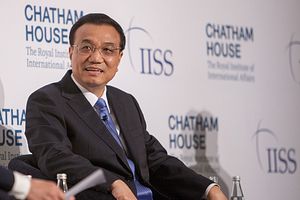On Wednesday, Chinese Premier Li Keqiang reassured investors and business leaders that China’s economy is still on track, and that it remains a welcoming environment for foreign firms.
Li was speaking at the “Annual Meeting of the New Champions 2014,” a yearly summit organized by the World Economic Forum with a specific focus on the “next generation of fast-growing enterprises.” China hosts the meeting each year, with this year’s forum being held in Tianjin. The gathering is often referred to as the “Summer Davos” forum, a reference to the World Economic Forum’s annual winter meeting in Davos, Switzerland.
Li Keqiang delivered the keynote speech to open the Summer Davos forum, which he used as an opportunity to reassure financial and business leaders that “China has all the confidence, ability and resources to realize its major economic and social goals for 2014,” according to Xinhua.
Li emphasized that China is not “distracted by the slight short-term fluctuations of individual indicators,” some of which (such as electricity consumption rates) seem to indicate a sharp slowdown in growth. Li’s message was designed to restore confidence in the Chinese economy, and also to make it clear that Beijing is not shying away from its vision of structural reform to the Chinese economy. Signs of a slowdown in China were “inevitable and within our expectation,” Li said. He noted that China still expects to reach its 7.5 percent growth target for the year, although Li also emphasized that the government does not see this as an absolute goal. Beijing will be satisfied if China’s economic growth “in within the proper range,” as Li indicated it was.
Li’s bottom line was that China’s economy was settling into a “new normal state,” and economic fluctuations are just a symptom of the change. China’s main priority during this time is to keep employment up, Li indicated, giving the economy time to adjust. In the meantime, Li promised new reforms, including pilot programs for private banks, further reforms to state-owned enterprises, less red tape for businesses, and reforms to China’s business taxation system. Li spoke optimistically of “turning the gains of reform into new dynamism of development that would bring more benefit to the people.”
But Li’s task was not limited to reassuring business leaders about the strength of China’s economy. He also had to convince foreign business executives that their companies and investments are still welcome in China. Beijing is in the midst of anti-monopoly crackdown, which has ensnared Western giants Microsoft and Jaguar. The anti-monopoly drive sparked concerns that the government is using the crackdown as an excuse to hamstring foreign firms. A survey by the American Chamber of Commerce in China (AmCham China) found that 60 percent of respondents feel foreign business is less welcome in China than it used to be, Bloomberg reported. Another AmCham China report cited “growing perceptions that multinational companies are under selective and subjective enforcement by Chinese government agencies.”
Li addressed these concerns as well. He defended the anti-monopoly probes by saying that they target both domestic and foreign firms. In fact, according to Li, only around 10 percent of the companies involved are foreign. Li reassured foreign companies that China would seek to open further to foreign investment and business operations. He also promised to sternly penalize intellectual property rights infringement, another perennial concern of foreign firms operating in China.

































